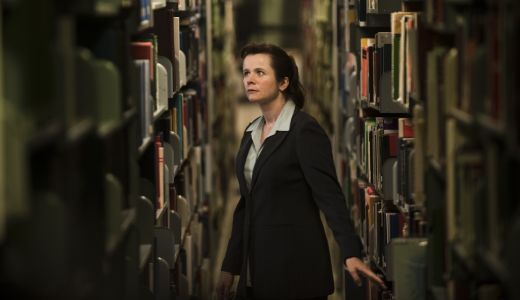Australia is still healing from the outrage and anguish caused by the Stolen Generations of Australian Aboriginal and Torres Strait Islander children forcibly removed from their parents between 1869 and 1969, internationally acknowledged in Phillip Noyce’s Rabbit-Proof Fence, with former Prime Minister Kevin Rudd’s formal apology only going part of the way towards reconciliation. During this same time, the UK also had a child migrant policy called Home Children, in which 100,000 children were sent to Canada, New Zealand, South Africa and Australia. The children were not necessarily orphans, and was disturbingly still going in the 1970s. Oranges and Sunshine, the debut feature film from Jim Loach (son of Ken Loach), explores this troubling heritage.
Social worker Margaret Humphries (Emily Watson, Cold Souls) is working in Nottingham in the UK when she unwittingly stumbles upon the previously hidden Home Children policy when approached by Charlotte (Federay Holmes), an Australian woman wanting to know who she is. After speaking with Jack (Hugo Weaving, Legend of the Guardians: The Owls of Ga’Hoole), the Australian brother of one of her charges, she discovers that thousands of British children were sent to Australia as part of a forced migration scheme. Being promised “oranges and sunshine”, but met only with harsh labour and unforgiving conditions at the hands of the institutions, the now adult migrants want to know where they came from. Margaret makes it her mission to uncover the truth, but is not only met with resentment from the authorities, but with fear and angst from former ward Len (David Wenham, Public Enemies).
There is a danger in these sweeping sagas of both reducing a cultural wound to the angst of a handful of Name Actors, or doing quite the opposite in blowing up the very intimate and personal details of generations of people for big-screen tears. Loach’s steady hand, honed over a number of years on television series such as Holby City, narrowly avoids either of these dilemmas (for the most part) by relying on factually-based script by Rona Munro (Almost Adult). The storyline is grounded in the realities of the era, and while Oranges and Sunshine doesn’t always avoid the obvious cliches of the genre (for it is rapidly becoming at least a sub-genre), it is accompanied by an earnestness from the filmmakers, and not to mention an incredibly talented group of actors. Weaving shows that his versatility shows no bounds, bouncing back and forth from quieter films such as Last Ride to the big-budget Hollywood blockbusters Transformers: Dark of the Moon and Captain America: The First Avenger. Watson shows that she is not adverse to trying new things, similarly finding herself in quirky fare such as Cold Souls and Synecdoche, New York and Steven Spielberg’s forthcoming War Horse.
Yet this shocking subject matter doesn’t always deliver the drama that one would assume from the description on the back of the box. There are some obvious moments of melodrama, however, with the choice to distill much of the complex narrative of 100,000 lost children into the two-hander between Wenham and Watson. Yet there is a certain emotional distance kept not only in this relationship, with the often taciturn Wenham giving us few opportunities to gain any understanding of his angst, and the reliance on the facts and occasional barrier to the deeper emotional and cultural scars that this case has unveiled. Where Rabbit-Proof Fence gave us a hit of the deep scar that ran through the nation, Oranges and Sunshine only scrapes the surface of the anguish. Yet throughout the narrative, Loach and Munro maintain a certain truth to the tale that less-accomplished filmmakers would have missed.
Jim Loach’s debut feature film is a fascinating, and undoubtedly tragic, tale of forgotten chapter of UK/Australian relations that is occasionally overwrought by melodrama, and other times keeping its distance. Either way, a strong debut from Loach and we are looking forward to more work from him in the future.
Oranges and Sunshine was released 9 June 2011 in Australia from Icon.






No Responses